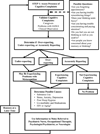Assessing and treating forgetfulness and cognitive problems in adults with HIV
- PMID: 23290376
- PMCID: PMC3591816
- DOI: 10.1016/j.jana.2012.03.006
Assessing and treating forgetfulness and cognitive problems in adults with HIV
Abstract
In addition to the immune system, HIV affects the nervous system and the brain, producing neurological sequelae, often resulting in forgetfulness and cognitive problems. These problems can compromise medication adherence, interfere with instrumental activities of daily living such as driving and managing finances, increase dependency, and decrease quality of life. Cognitive problems emerge due to a variety of reasons; likewise, several evidence-based methods to mitigate causes and compensate for cognitive problems can be used alone or in combination. This article focuses on nonpathological, nondementia forgetfulness and cognitive problems. However, dementia must be considered and assessed as measured by marked cognitive decline over time. Methods for assessing and measuring forgetfulness and cognitive problems are provided. In addition, methods of treating nonpathological cognitive problems are provided, ranging from Recommended for Practice to Not Recommended for Practice. A case study is presented to demonstrate how to implement recommended treatment options.
Copyright © 2013 Association of Nurses in AIDS Care. Published by Elsevier Inc. All rights reserved.
Conflict of interest statement
No other authors have a conflict of interest.
Figures




References
-
- Al-Khindi T, Zakzanis KK, van Gorp WG. Does antiretroviral therapy improve HIV-associated cognitive impairment? A quantitative review of the literature. Journal of the International Neuropsychological Society. 2011;17:1–14. - PubMed
-
- Athilingam P, King KB, Burgin SW, Ackerman M, Cushman LA, Chen L. Montreal Cognitive Assessment and Mini-Mental Status Examination compared as cognitive screening tools in heart failure. Heart and Lung: The Journal of Acute and Critical Care. 2011 [Epub ahead of print]. - PubMed
-
- Atkins JH, Rubenstein SL, Sota TL, Rueda S, Fenta H, Bacon J, Rourke SB. Impact of social support on cognitive symptom burden in HIV/AIDS. AIDS Care. 2010;22(7):793–802. - PubMed
-
- Baldewicz TT, Leserman J, Silva SG, Petitto JM, Golden RN, Perkins DO, Evans DL. Changes in neuropsychological functioning with progression of HIV-1 infection: Results of an 8-year longitudinal investigation. AIDS and Behavior. 2004;8(3):345–355. - PubMed
-
- Bassil N, Morley JE. Late-life onset hypogonadism: A review. Clinics in Geriatric Medicine. 2010;26(2):197–222. - PubMed
Publication types
MeSH terms
Grants and funding
LinkOut - more resources
Full Text Sources
Other Literature Sources
Medical

